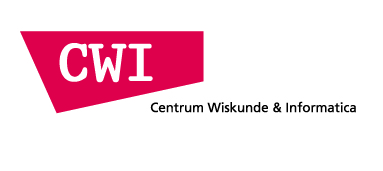
CWI Distinguished Scientist Symposium: Quantum information
We are happy to invite you to a symposium with Richard Cleve, who is visiting the Algorithms and Complexity group of CWI as Distinguished Scientist this term. It will take place on
-
Thursday July 21, 2011
14:00-17:15
Room L0.17, at the ground floor of the new wing of
CWI.
Science Park 123, 1098 XG Amsterdam.
Directions to CWI
The programme consists of four talks, followed by drinks
(there is no need to register).
Schedule
- 14:00-14:45 Richard Cleve (Waterloo): Nonlocality in an information processing context
- 14:45-15:30 Serge Massar (Brussels): The certitude of quantum randomness
- Coffee/tea break
- 15:45-16:30 Monique Laurent (CWI and Tilburg): Optimization over polynomials with sums of squares and moment matrices
- 16:30-17:15 Mario Szegedy (Rutgers): Quantum query complexity of state conversion
-
Drinks
Abstracts
- 14:00-14:45 Richard Cleve (Waterloo): Nonlocality in an information processing context
Abstract:
Nonlocality refers to quantum mechanical effects where two (or more)
physically-separated systems can exhibit correlations that are
impossible to attain in classical physics. These effects were first
studied almost fifty years ago as a means of understanding quantum
mechanical behavior. However, in more recent decades,
information-processing concepts related to distributed computing have
emerged that have put non-locality in a new light. The interplay between
physics and computing has led to some fruitful results in both fields. I
will survey a few of the key results in this area.
- 14:45-15:30 Serge Massar (Brussels): The certitude of quantum randomness
Abstract:
Randomness is a fascinating topic. Its very existence is questioned by philosophers. On the other hand it is very widely used in our information based society. So what is the best approach for generating random numbers? Quantum mechanics, the theory of microscopic particles, offers solutions. In particular by using two entangled particles and the non local correlations they can exhibit, one can generate random numbers with security and reliability impossible with any other scheme. We will present this approach; and also discuss the quantitative relationship between the degree of entanglement, of non locality, and of randomness that can be certified in this way.
- 15:45-16:30 Monique Laurent (CWI and Tilburg): Optimization over polynomials with sums of squares and moment matrices
Abstract:
Polynomial optimization deals with the problem of minimizing a multivariate polynomial over a basic closed semi-algebraic set K defined by polynomial inequalities and equations.
While polynomial time solvable when all polynomials are linear (via linear programming), the problem is hard in general as soon as it involves non-linear polynomials.
A natural approach is to relax the problem and to consider easier to solve, convex relaxations.
The basic idea, which goes back to work of Hilbert, is to relax non-negative polynomials by sums of squares of polynomials, a notion which can be tested efficiently (using semidefinite programming). On the dual side, one views points as (atomic) measures and one searches for efficient conditions characterizing sequences of moments of non-negative measures on the semi-algebraic set K.
In this way hierarchies of efficient convex relaxations can be build.
We will review their various properties. In particular, convergence properties, that rely on real algebraic geometry representation results for positive polynomials, stopping criteria and extraction of global minimizers, that rely on results from moment theory and commutative algebra. We will mention how the methodology extends to polynomial optimization problems with non-commutative variables.
- 16:30-17:15 Mario Szegedy (Rutgers): Quantum query complexity of state conversion
Abstract:
State-conversion generalizes query complexity to the problem
of converting between two input-dependent quantum states by making
queries to the input. We characterize the complexity of this problem
by introducing a natural information-theoretic norm that extends the
Schur product operator norm. The complexity of converting between two
systems of states is given by the distance between them, as measured by this norm.
In the special case of function evaluation, the norm is closely related
to the general adversary bound, a semi-definite program that
lower-bounds the number of input queries needed by a quantum algorithm
to evaluate a function. We thus obtain that the general adversary
bound characterizes the quantum query complexity of any function
whatsoever. This generalizes and simplifies the proof of the same
result in the case of boolean input and output. Also in the case of
function evaluation, we show that our norm satisfies a remarkable
composition property, implying that the quantum query complexity of the
composition of two functions is at most the product of the query
complexities of the functions, up to a constant. Finally, our result
implies that discrete and continuous-time query models are equivalent
in the bounded-error setting, even for the general state-conversion
problem.
Joint work with Troy Lee, Rajat Mittal, Ben W. Reichardt and Robert Spalek
This page is maintained by Ronald de Wolf.
Last update: July 20, 2011
